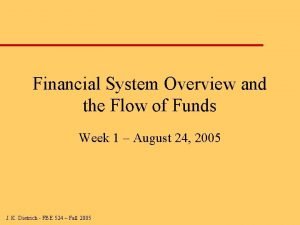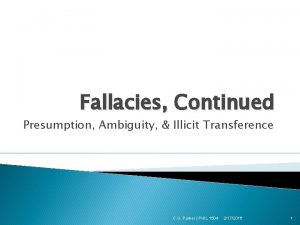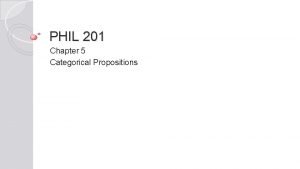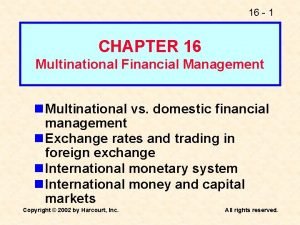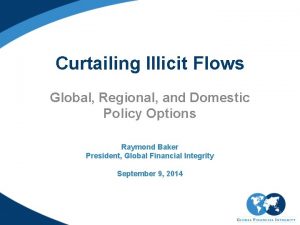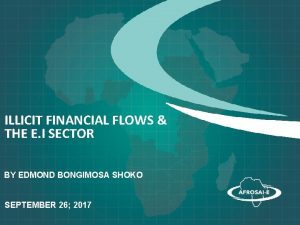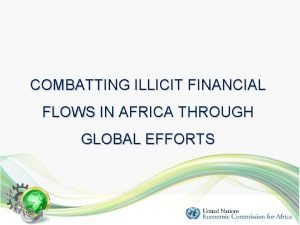Domestic Consequences of Illicit Financial Flows Olav Lundstl






- Slides: 6

Domestic Consequences of Illicit Financial Flows Olav Lundstøl Counsellor-Energy and Petroleum Royal Norwegian Embassy in Brasilia Rio de Janeiro, 9 September 2014

IFF, Tax Havens and Development • Secrecy jurisdictions/tax havens, illicit financial flows/capital flight and challenges of inequality in the western world and emerging economies • >50% of world trade through tax havens, 50% of all banking assets held in offshore accounts, >30% of all FDI through offshore accounts, balance sheet of small island countries > 18 trillion USD or about 1/3 of world GDP (of this >12 trillion USD held by rich individuals (Shaxson, 2010) • Norway: Monterrey conference on financing for development (2002), White paper (2009), multiple global, regional and national initiatives

Domestic Consequences: The Developed Economies • Economic inequality rising to pre WW 1 levels in the developed world and expected to continue, overall linked to unequal sharing of gains from increase in productivity between labour and capital (T Picketty) • The management of the global financial crisis and the euro zone crisis have both contributed further to the increase in inequality in several respective countries and has de facto facilitated a transfer of wealth from the state and the majority of the population to the richest (R Skarstein, 2013 and V Norman 2012) • The situation is even worse however because, T Picketty broadly leaves untreated: 1) the offshore economy that has increased to unprecedented historical levels in the last few decades, and 2) the increasing element of south-north net capital flows through offshore accounts (K Rogoff, 2014)

Domestic Consequences: The Emerging Economies • Lost financing for development, through profitable private and public investments in a world with increasing inequality • IFF from the developing world 500 -1000 billion USD/yr, exceeds net legal capital inflow to the developing world and many times ODA • Capital outflows increasing from several emerging economies with low savings and investment rates and high rates of resource extraction (GFI 2014 East Africa report on trade misinvoicing) • Net effect of illicit financial flows on growth and poverty has been estimated to be of such magnitude that MDG 1 could have been achieved for SSA as a whole (J Nkurunziza, 2014)

Domestic Consequences: What about Brazil? • Estimated 520 billion USD of assets in secrecy jurisdictions (TJN 2013) • The 7 th highest cumulative IFF outflow among developing countries last decade (GFI 2013) • Productivity challenge in overall economy, accompanied by low levels of savings and investments, in particular during last two decades, compared to benchmark countries (IMF, 2013) • Infrastructure stock 17% of GDP (compared to 50 -75% of GDP for benchmark countries) (Mckinsey, 2012) • Investment in infrastructure 1. 5% of GDP in 2013 (compared to 5. 1% of GDP for developing countries) • Estimates puts the overall infrastructure investment needed at 1. 4 trillion R to bring Brazil up to the level of benchmark countries, about three times the current levels announced for the coming decades (Federal University of Rio, 2013) • Economic recession in 2014 following low levels of growth in later years • Estimated IFF about the same as investment in infrastructure in 2012

Outlook A. International Risk: IFF and inequality on upward trend Opportunity: High level political and tehnical attention (G 8 - three T’s, OECD, IMF, UN, BRICS) Opportunity: Automatic Exchange of Information, Extended country by country reporting, Global Financial System Scrutiny Needed: A new global and national approach to regulating and taxing international business B. Brazil Risk: Rapid increase in large infrastructure investments and pre-sal development Opportunity: Implementation of new approaches to limit trade misinvoicing beyond the arm’s length principle Opportunity: Increased focus on large financial and economic crimes through new legislation and special courts and innovative follow up an enforcment Needed: Active participation, possibly through BRICS, to influence new rules and approach to regulating and taxing international business
